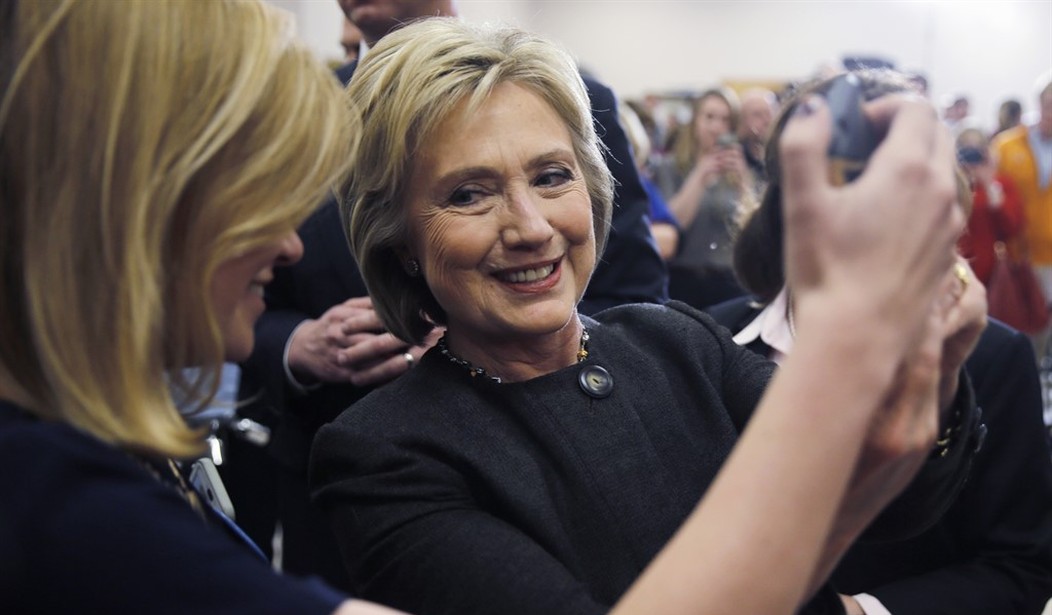This has not been a good week for Hillary Clinton. She prevailed over Sen. Bernie Sanders in the Iowa Democratic presidential caucuses by less than four tenths of one percent of all votes cast, after having led him in polls in Iowa at one time by 40 percentage points. In her statement to supporters, standing in front of her gaunt and listless looking husband, she was not able to mouth the word "victory" or any of its standard variants. She could barely hide her contempt for the Iowa Democrats who deserted her.
Sanders isn't even a Democrat. According to official Senate records, he is an "Independent Socialist" who votes to organize the Senate with the Democrats, and sits on the Senate floor with them. Clinton, of course, is the heiress to the mightiest Democratic political apparatus in the land. Hence the question: What do the Iowa Democrats know that caused thousands of them to flee from her?
They know she is a crook.
On the Friday before Monday's caucuses, the State Department, which Clinton headed in President Obama's first term, revealed that it discovered 22 top-secret emails on the private computer server to which Clinton diverted all her governmental email traffic. This acknowledgement marks a radical departure from previous State Department pronouncements and is a direct repudiation of Clinton's repeated assertions.
She has repeatedly asserted that she neither sent nor received anything "marked classified" using her private email server. The State Department, until last Friday, has backed that up by claiming that while the substance of at least 1,300 of her emails was confidential, secret or top secret, they were not "marked" as such when she dealt with them.
These are word games. First, under the law, nothing is "marked classified." The markings are "confidential" or "secret" or "top secret," and Clinton knows this. Second, under the law, it is not the markings on the email headers that make the contents state secrets; it is the vulnerability of the contents of the emails to impair the government's national security mission that rationally characterizes them as secrets.
Recommended
Clinton knows this because she signed an oath on Jan. 22, 2009 recognizing that state secrets retain their secrecy status whether "marked or unmarked" by any of the secrecy designations. She knows as well that, under the law, the secretary of state is charged with knowing state secrets when she comes upon them.
Yet, in order to further Clinton's deceptive narrative, the State Department has consistently claimed that it retroactively marked at least 1,300 emails as state secrets. It did this until last Friday.
Last Friday, the State Department revealed that 22 emails it found on Clinton's private server were in fact top secret, and were in fact marked top secret, and were in fact sent to or received from President Obama. This is a revelation that substantially undermines Clinton's political arguments and is catastrophic to her legal position.
Politically, Clinton has lost the final argument in her public arsenal -- that she did not recognize top-secret data unless it was marked as top secret. She has also lost the ability to claim, as she has repeatedly, that she neither sent nor received anything marked classified, as meaningless as that phrase is.
Legally, the ground under Clinton continues to crumble. The more she denies, the more she admits. How can that be? That is so because her denials are essentially an admission of ignorance, forgetfulness or negligence, and, under the law, these are not defenses to the failure to safeguard state secrets entrusted to the secretary of state. They are, instead, recognition of that failure.
Late Monday afternoon, before the Iowa caucuses convened and after Clinton's political folks had lobbied their former colleagues at the State Department to re-characterize what they found and revealed late last week, the State Department reversed itself and claimed that the 22 emails were not "marked" top secret. It was too little and too late. The cat was out of the bag and Iowa Democrats knew it. Few really believed that the State Department would state publicly that the 22 emails were top secret and then state publicly that they were not, without a political motivation and irrespective of the truth. All this is infuriating to the FBI, which perceives these word games as mocking its fidelity to the rule of law.
Sanders' presence in the Democratic primaries will continue to give Democrats who mistrust Clinton a safe political haven. But he is not Clinton's real worry. Her real worry is an FBI committed to the rule of law and determined to fortify national security by gathering the evidence of her mishandling state secrets.
Let's be as blunt about this as the FBI will be: Causing state secrets to reside in a nonsecure, nongovernmental venue, whether done intentionally or negligently, constitutes the crime of espionage.
And there is more. When asked about the consequences of Clinton's brazen exposure of state secrets to anyone who knows how to hack into a nonsecure computer, an intelligence operative winced as if in pain when he remarked that the nation's then chief diplomat surely compromised the "sources, methods, and lives" of her colleagues.
Even Democrats who see Clinton as a symbol of their long-time wish for a progressive female in the Oval Office are beginning to recognize that anyone who has jeopardized American lives for political gain is unworthy of their votes, unworthy of their trust and unworthy of public office.

























Join the conversation as a VIP Member